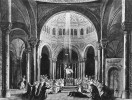| Richard Wagner operas |
|
• Die Feen (1833) • Das Liebesverbot (1836) • Rienzi (1842) • Der fliegende Holländer (1843) • Tannhäuser (1845) • Lohengrin (1847) • Tristan und Isolde (1859) • Die Meistersinger von Nürnberg (1867) • Das Rheingold (1869) • Die Walküre (1870) • Siegfried (1871) • Götterdämmerung (1874) • Parsifal (1882) |
“Parsifal” by Richard Wagner
Premiere / date of written: 26 July 1882
“I believe my compassion to be the strongest feature of my moral being — and probably the source of my strength.” Richard Wagner
Parsifal opera in three acts is loosely based on Parzival by Wolfram von Eschenbach, a 13th-century epic poem of the Arthurian knight Parzival (Percival) and his quest for the Holy Grail (12th century).
Wagner first conceived the work in April 1857 but did not finish it until twenty-five years later. It was Wagner's last completed opera and in composing it he took advantage of the particular acoustics of his Bayreuth Festspielhaus. Parsifal was first produced at the second Bayreuth Festival in the Festspielhaus on 26 July 1882 under the baton of the German-born Jewish conductor Hermann Levi. The Bayreuth Festival maintained a monopoly on Parsifal productions until 1903, when the opera was performed at the Metropolitan Opera in New York.
Wagner described Parsifal not as an opera, but as "Ein Bühnenweihfestspiel" ("A Festival Play for the Consecration of the Stage"). At Bayreuth a tradition has arisen that there be no applause after the first act of the opera.
Wagner's spelling of Parsifal instead of the Parzival he had used up to 1877 is informed by an erroneous etymology of the name Percival deriving it from a supposedly Persian origin, Fal Parsi meaning "pure fool".
Libretti
| # | Language | Authors |
|---|---|---|
| 1 |
German
|
Richard Wagner |
| 2 |
English
|
![]() original libretto
original libretto
![]() line-by-line of the original libretto
line-by-line of the original libretto
Images
Audio recordings
External links
- Wikipedia, the free encyclopedia
- Sheet Music — www.sheetmusicplus.com
